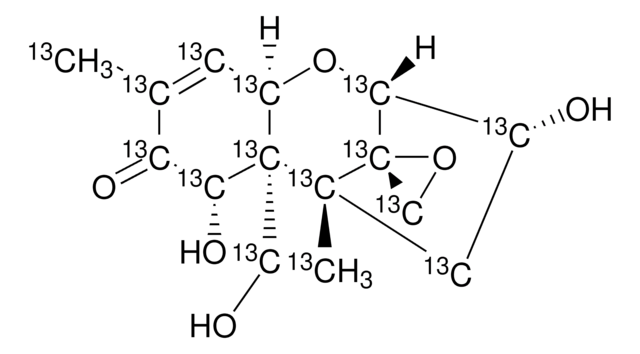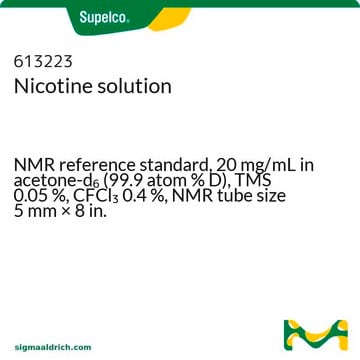36733
(−)-Nicotine
PESTANAL®, analytical standard
Synonym(s):
(−)-1-Methyl-2-(3-pyridyl)pyrrolidine, (S)-3-(1-Methyl-2-pyrrolidinyl)pyridine
About This Item
Recommended Products
grade
analytical standard
Quality Level
product line
PESTANAL®
shelf life
limited shelf life, expiry date on the label
technique(s)
HPLC: suitable
gas chromatography (GC): suitable
refractive index
n20/D 1.5265 (lit.)
density
1.010 g/mL at 20 °C (lit.)
application(s)
agriculture
cleaning products
cosmetics
environmental
food and beverages
personal care
format
neat
SMILES string
CN1CCC[C@H]1c2cccnc2
InChI
1S/C10H14N2/c1-12-7-3-5-10(12)9-4-2-6-11-8-9/h2,4,6,8,10H,3,5,7H2,1H3/t10-/m0/s1
InChI key
SNICXCGAKADSCV-JTQLQIEISA-N
Gene Information
human ... CHRNA2(1135) , CHRNA4(1137) , CHRNB2(1141)
Looking for similar products? Visit Product Comparison Guide
Related Categories
Application
Biochem/physiol Actions
Legal Information
Signal Word
Danger
Hazard Statements
Precautionary Statements
Hazard Classifications
Acute Tox. 1 Oral - Acute Tox. 2 Dermal - Acute Tox. 2 Inhalation - Aquatic Chronic 2 - Eye Dam. 1 - Skin Irrit. 2
Storage Class Code
6.1A - Combustible acute toxic Cat. 1 and 2 / very toxic hazardous materials
WGK
WGK 3
Flash Point(F)
213.8 °F - closed cup
Flash Point(C)
101 °C - closed cup
Personal Protective Equipment
Choose from one of the most recent versions:
Already Own This Product?
Find documentation for the products that you have recently purchased in the Document Library.
Customers Also Viewed
Protocols
Test your food for fipronil contamination using our analytical standards, certified reference materials, solvents, and columns for analysis.
Test your food for fipronil contamination using our analytical standards, certified reference materials, solvents, and columns for analysis.
Test your food for fipronil contamination using our analytical standards, certified reference materials, solvents, and columns for analysis.
Test your food for fipronil contamination using our analytical standards, certified reference materials, solvents, and columns for analysis.
Our team of scientists has experience in all areas of research including Life Science, Material Science, Chemical Synthesis, Chromatography, Analytical and many others.
Contact Technical Service










